

Renaissance Period. Renaissance (c. 1500 – c. 1688) The Renaissance takes place at different times in different countries.
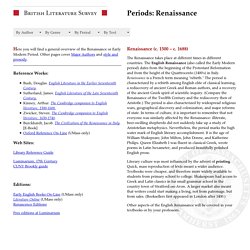
The English Renaissance (also called the Early Modern period) dates from the beginning of the Protestant Reformation and from the height of the Quattrocento (1400's) in Italy. Renaissance is a French term meaning "rebirth. " ANGLO-SAXON PROSE. In all language ,poetry made its appearance before prose ,and that was also true about Anglo-Saxon prose.Anglo-Saxon prose ,however ,fared much better than its counterpart -Anglo-Saxon poetry .In fact English literary prose came actually as late as nineteenth century under king Alfred's patronization.Anglo-Saxon poetry was archaic and a bit complicated ,but Anglo -Saxon prose was rather comparatively modern and simple.

About Anglo-Saxon prose ,two specific features must be noted at the very beginning .In the very first place it has an essentially has national appearance .In the second place ,it is much closer to modern English than Anglo-Saxon poetry. Aeifric and Wulfstan are the most prominent prose writer of Anglo-Saxon age .Catholic Homilies is famous book of Aeifric.There are a few prose works Blickling Homilies ,a group of nineteenth sermon ,contained in a manuscript ,And some other homilies and fragmentary prose works.
Anglo-Saxon literature: Prose. Old English literary prose dates from the latter part of the Anglo-Saxon period.

Prose was written in Latin before the reign of King Alfred (reigned 871–99), who worked to revitalize English culture after the devastating Danish invasions ended. As hardly anyone could read Latin, Alfred translated or had translated the most important Latin texts. He also encouraged writing in the vernacular. Rutgers University. ANGLO-SAXON POETRY. Art imitates life so the mimetic theory stipulates.
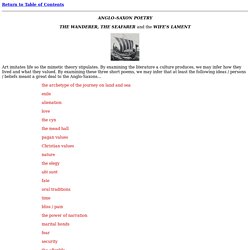
By examining the literature a culture produces, we may infer how they lived and what they valued. By examining these three short poems, we may infer that at least the following ideas / persons / beliefs meant a great deal to the Anglo-Saxons... the archetype of the journey on land and sea exile. Anglo-Saxon literature: Poetry. There are two types of Old English poetry: the heroic, the sources of which are pre-Christian Germanic myth, history, and custom; and the Christian.

Although nearly all Old English poetry is preserved in only four manuscripts—indicating that what has survived is not necessarily the best or most representative—much of it is of high literary quality. Moreover, Old English heroic poetry is the earliest extant in all of Germanic literature. It is thus the nearest we can come to the oral pagan literature of Germanic culture, and is also of inestimable value as a source of knowledge about many aspects of Germanic society. Anglo-Saxon Culture. The Anglo-Saxons were Germanic barbarians who invaded Britain and took over large parts of the island in the centuries following the withdrawal of the Roman Empire.
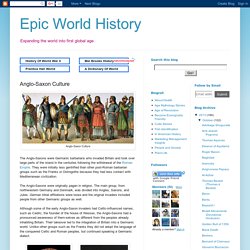
They were initially less gentrified than other post-Roman barbarian groups such as the Franks or Ostrogoths because they had less contact with Mediterranean civilization. The Anglo-Saxons were originally pagan in religion. The main group, from northwestern Germany and Denmark, was divided into Angles, Saxons, and Jutes. German tribal affiliations were loose and the original invaders included people from other Germanic groups as well. Although some of the early Anglo-Saxon invaders had Celtic-influenced names, such as Cedric, the founder of the house of Wessex, the Anglo-Saxons had a pronounced awareness of them-selves as different from the peoples already inhabiting Britain. The Anglo-Saxon kings > Alfred 'The Great' Alfred 'The Great' (r. 871-899) Born at Wantage, Berkshire, in 849, Alfred was the fifth son of Aethelwulf, king of the West Saxons.
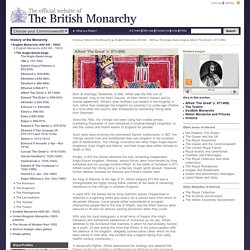
At their father's behest and by mutual agreement, Alfred's elder brothers succeeded to the kingship in turn, rather than endanger the kingdom by passing it to under-age children at a time when the country was threatened by worsening Viking raids from Denmark. Alfred the Great: The Most Perfect Man in History? King Alfred of Wessex (r.871-99) is probably the best known of all Anglo-Saxon rulers, even if the first thing to come into many people’s minds in connection with him is something to do with burnt confectionery.
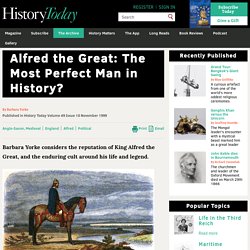
The year 1999 saw the 1100th anniversary of his death on October 26th, 899, at the age of about 50. The occasion is being marked with conferences and exhibitions in Winchester, Southampton and London, but the scale of celebrations will be modest compared with those which commemorated his millenary, and culminated in the unveiling by Lord Rosebery of his statue in Winchester.
Alfred’s reputation still stands high with historians, though few would now want to follow Edward Freeman in claiming him as ‘the most perfect character in history’ (The History of the Norman Conquest of England, 5 volumes, 1867-79). Alfred is someone who has had greatness thrust upon him. Primary History - Anglo-Saxons - Kings and laws. Linguistics 201: History of the English Language. All languages change over time.
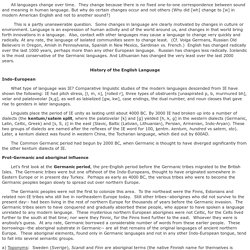
They change because there is no fixed one-to-one correspondence between sound and meaning in human language. But why do certain changes occur and not others (Why did [wh] change to [w] in modern American English and not to another sound?) This is a partly unanswerable question. Some changes in language are clearly motivated by changes in culture or environment. Language is an expression of human activity and of the world around us, and changes in that world bring forth innovations in a language.
Exploring the Depth and Beauty of Anglo-Saxon Literature. This map shows kingdoms in the island of Great Britain at about the year 800 CE.
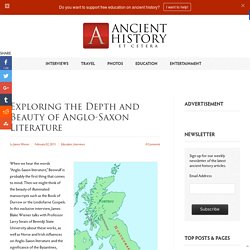
When we hear the words “Anglo-Saxon literature,” Beowulf is probably the first thing that comes to mind. Then we might think of the beauty of illuminated manuscripts such as the Book of Durrow or the Lindisfarne Gospels. In this exclusive interview, James Blake Wiener talks with Professor Larry Swain of Bemidji State University about these works, as well as Norse and Irish influences on Anglo-Saxon literature and the significance of the Byzantines, Theodore and Hadrian, who came to Northumbria in the seventh century CE.
Professor Swain recommends learning Old English in order to be able to read works in Old English, of course, but equally intriguing, to allow us to better express ourselves in modern English. 10 Notable Anglo-Saxon Works Besides Beowulf. The heroic tale of Beowulf is the most noteworthy work of the Anglo-Saxon era and is often regarded as a major Germanic work but it is good to know about other notable works of the respective era that are important in their own ways. Anglo-Saxon era is marking of the official beginning of English literature; the literature of the respective era is also termed as the Germanic narrative and is reflective of the ancient Anglo-Saxon community. The literature of Germanic period is largely based on religious stories, lives and works of religious figures and tales composed by drawing inspiration from Biblical accounts.
The main reason of it is that Bible was the only source of knowledge available, which acts as a muse for the literary figures of the time. Alongside Biblical references, oral tradition was also a significant influence on the Anglo-Saxon writers. Below are 10 of the remarkable Anglo-Saxon works besides Beowulf, which are quite interesting to know, if not equally important. Anglo-Saxon Culture. Anglo-Saxon. Anglo-Saxon, term used historically to describe any member of the Germanic peoples who, from the 5th century ce to the time of the Norman Conquest (1066), inhabited and ruled territories that are today part of England and Wales.
According to St. Bede the Venerable, the Anglo-Saxons were the descendants of three different Germanic peoples—the Angles, Saxons, and Jutes. By Bede’s account, those peoples originally migrated from northern Germany to the island of Britain in the 5th century at the invitation of Vortigern, a ruler of Britons, to help defend his kingdom against marauding invasions by the Picts and Scotti, who occupied what is now Scotland.
History - Ancient History in depth: The Anglo-Saxons. Anglo-Saxon literature Facts, information, pictures.